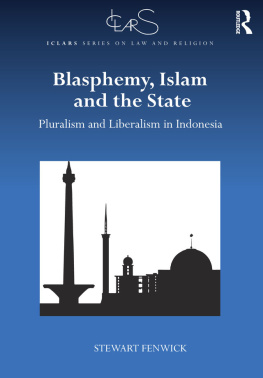THE LEGAL TREATMENT OF MUSLIM MINORITIES IN ITALY
Andrea Pins book offers an encompassing account of the legal treatment of religious minorities in Italy. Interestingly enough, it shows that the Italian constitutional culture and its statereligion model look well equipped to address one of the biggest challenges of our times: the place of Islam in the West.
Marta Cartabia, Italian Constitutional Court
Islam challenges both the secular and the Catholic tradition of Italy. This book designs a triangle, where the Italian Catholic background and secular legal system react to the Islamic presence through judicial accommodations and political negotiations fostering the contamination of models and identities. A key contribution to understand one of the most interesting patterns of integration in Europe.
Silvio Ferrari, University of Milan, Italy
The countries of Europe have adapted in different ways to the collapse of their monolithic Christian inheritance and the rise of Muslim traditions, laws and practices. Professor Pin explores the extent to which Islam has become integrated into civil society and churchstate relations in Italy. His study reveals the self-made difficulties which have arisen in consequence of insufficient attention being given to adapting existing structures, modelled on Vatican concordats, to the requirements of an unfamiliar faith which is neither fully accepted nor properly understood. This book is a thoughtful and profound analysis of the current dysfunctionality of Italys governmental engagement with Islam, and a convincing plea for it to be revisited through a more honest, focussed and pragmatic dialogue.
Mark Hill QC, Cardiff University, UK
Professor Pin has done yeoman service in bringing this revealing and promising story of Muslim religious culture and religious freedom in Italy to the attention of the English speaking world. His writing is deeply researched, refreshingly comparative, boldly proffered, and often wise beyond his youthful years. It is a privilege and pleasure to commend this important study.
John Witte, Jr., Emory University, USA
First published 2016 by Ashgate Publishing
Published 2016 by Routledge
2 Park Square, Milton Park, Abingdon, Oxon OX14 4RN
711 Third Avenue, New York, NY 10017, USA
Routledge is an imprint of the Taylor & Francis Group, an informa business
Copyright 2016 Andrea Pin
Andrea Pin has asserted his right under the Copyright, Designs and Patents Act, 1988, to be identified as the author of this work.
All rights reserved. No part of this book may be reprinted or reproduced or utilised in any form or by any electronic, mechanical, or other means, now known or hereafter invented, including photocopying and recording, or in any information storage or retrieval system, without permission in writing from the publishers.
Notice:
Product or corporate names may be trademarks or registered trademarks, and are used only for identification and explanation without intent to infringe.
British Library Cataloguing in Publication Data
A catalogue record for this book is available from the British Library.
The Library of Congress has cataloged the printed edition as follows:
Pin, Andrea, author.
The legal treatment of Muslim minorities in Italy : Islam and the neutral state / by Andrea Pin.
pages cm
Includes bibliographical references and index.
ISBN 978-1-4724-5023-4 (hardback)
1. Muslim minoritiesLegal status, laws, etc.Italy.
2. Islamic lawItaly. 3. Islam and stateItaly I. Title.
KKH2467.M56P56 2015
342.4508'5297-dc23
2015021232
ISBN 9781472450234 (hbk)
Contents
Since 9/11, the place of Islam in Western society has become an ever more urgent question. Other tragic events in the West since 9/11 have kept the question in the headlines. Think of Fort Hood, 7/7, the Spanish train station bombings, the carnage at the Boston Marathon, the Canadian Parliament and Charlie Hebdo, among others, let alone the ongoing wars in Afghanistan, Iraq and Syria, and the repeated acts of violence in North Africa, the Middle East, Russia, Eurasia and the Indian subcontinent. To be sure, it is now commonplace to distinguish between radical Islamicism and authentic Islam, and to view terrorism and jihadism as a betrayal of the Prophets abiding message of peace, love and justice that the vast majority of Muslims around the world have embraced. But for many Westerners, it has been hard to look beyond the gratuitous bloodshed and carnage that Islamicist terrorism has inflicted and the massive costs to life, liberty and property that have been imposed by the necessary military, security and police responses to terrorism. Anti-Muslim sentiment has developed quickly in many Western nations over the past 15 years. Major battles over the place of Islam in the West have broken out on the streets and in the courts, in schools and in churches, in scholarly tracts and in legislative initiatives targeting Islam.
Italy has been largely spared from Islamicist terrorism to date, though it sits perilously close to several hotbeds of Islamicist radicalism around the Mediterranean. And the diverse Muslim communities of Italy, more than a million strong in number, have found ways of living peaceably in this ancient Catholic land that was long at the heart of Western Christendom. In this first book-length study of Islam and Italy to be published in English, Professor Andrea Pin of the University of Padua explores how and why Islam and Italy have so far reached a rapproachment and what the prospects are for this peaceful coexistence to continue.
One reason for this rapproachment, Professor Pin shows, lies in the immense diversity of Italian Muslims, who represent numerous cultural, linguistic, regional, ethnic, tribal and religious sectors of global Islam, each with their own views on Islamic public and private life. This pluralism has provided an effective internal check and balance against any one group or ideology dominating or radicalizing Italian Muslims. And it has empowered a number of migr Muslims to assimilate more easily in Italy than their compatriots abroad might have countenanced.
A second reason lies in the commitment to religious freedom of Italian Catholicism. Since the Second Vatican Council in the mid-1960s, the Catholic Church has been a champion of religious freedom for all peaceable souls around the world, not least Muslims. Particularly during the long reign of Pope John Paul II and now again under Pope Francis, the Catholic Church has reached out generously to its Muslim neighbors at home and around the Mediterranean, finding common cause in issues like marriage and family life, and building mutual understanding among the sundry children of Abraham. This has made the dominant Catholic culture of Italy, with its nerve center in Rome, more welcoming to Muslims than many other cultures in Europe.
A third reason lies in Italys distinct approach to religious freedom. The Italian constitutional principle of laicit counsels a basic separation of church and state and a basic commitment to religious neutrality by the stateprinciples that are confirmed by the case law of the European Court of Human Rights. But Italy also seeks to balance traditional Catholic values of Italy with the needs of new immigrants and modern cultures. Unlike its French namesake laicit, which often promotes aggressive secularism against both traditional and new religions, Italian laicit remains more open to retaining old traditions that were once rooted in religious teachings, but are now woven into Italian culture. Alongside this principle, however, Italy has worked out individual concordats or peace treaties between the state and religious groups that allow for carefully tailored legal accommodations of the special needs and concerns of its minority faiths. Despite their diversity, most Muslims in Italy (and elsewhere) need accommodations for Friday worship and other holidays, access to mosques and Muslim cemeteries,

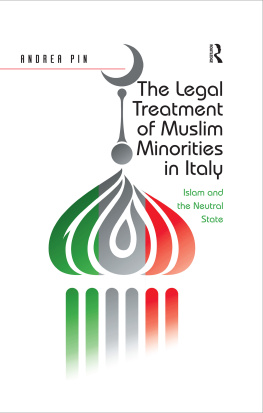

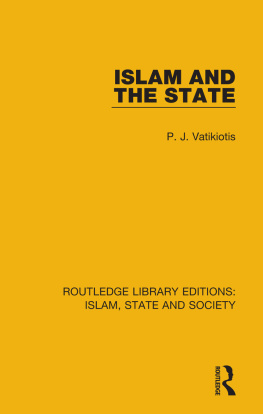
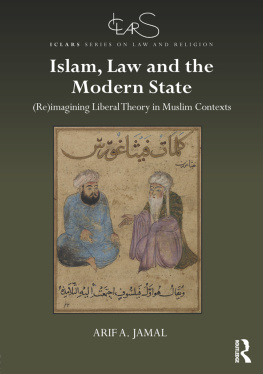
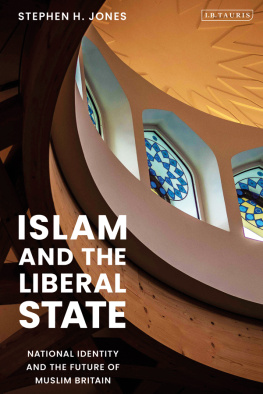
![Blackford - Freedom of religion [and] the secular state](/uploads/posts/book/167779/thumbs/blackford-freedom-of-religion-and-the-secular.jpg)
